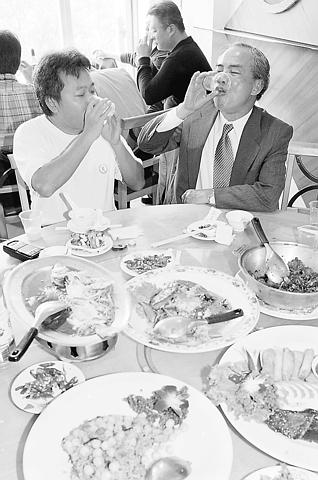National Assembly deputies, criticized as being "self-serving" for adopting an amendment to extend their own terms of office last year, made amends by passing another reform package that marginalized the Assembly on Monday.
"This [positive image] is the only thing we've got from this reform. We can at least face the public, by showing them that we've achieved goals [complying with public expectations]," said Chen Chin-te (
Chen and caucus chief executive Liu I-teh (

PHOTO: CHEN CHENG-CHANG, TAIPEI TIMES
Although Chen and Liu argued that the extension was a necessary evil -- in exchange for support from the deputies for a plan to freeze the Assembly and attain the DPP's goal for reform -- public criticism was so fierce that Chen's colleagues launched a recall bid against him. The campaign, however, was unsuccessful.
Under public pressure, the KMT also revoked the membership of then-speaker Su Nan-cheng (
The minority New Party -- which had refused to endorse the amendment -- filed an application with the Council of Grand Justices for a constitutional interpretation soon after it was adopted.
The Grand Justices issued their ruling invalidating the extension amendment, along with the one to freeze the Assembly in March.
With just two months left before the expiration of the deputies' term, Chen and Liu met with the KMT caucus again and agreed to new measures calculated to make up for their failure.
The marginalization plan -- which was intended to turn the Assembly into a non-standing body starting May 20 -- was hammered out in just one round of talks.
The revised plan won the support of the New Party. "This reform is like atoning for a big mistake," agreed Wang Kao-cheng (
Wang said the plan was important to Taiwan's constitutional development because it moved most of the Assembly's powers to the Legislative Yuan -- ? resolving the long-term problem deriving from the existence of two executive bodies.
Wang said that previously the National Assembly was required to convene at least once a year and could also propose extraordinary sessions.
This was despite the fact, he said, that the Assembly's main functions were to amend the Constitution and confirm the president's appointment of Judicial Yuan, Control Yuan and Examination Yuan members.
"The need to do these jobs doesn't emerge very often. But Assembly deputies would always come up with some excuse to lengthen the session so that they could get paid for the meeting," Wang said.
Wang said marginalizing the Assembly would save taxpayers' money.
Also, under the reform, the threshold for amending the Constitution has been raised.
To amend the Constitution now a vote will need to be passed in the legislature with at least a three quarters majority, then submitted to the Assembly for a final confirmation, which also needs 75 percent support.
"This can prevent politicians from adopting any self-serving measures," Wang said.
Chen said he was glad of the opportunity to promote the reform, which he claimed was a major step forward in Taiwan's political system.
"There is no way to stop public opinion abolishing the National Assembly," Chen said.

Intelligence agents have recorded 510,000 instances of “controversial information” being spread online by the Chinese Communist Party (CCP) so far this year, the National Security Bureau (NSB) said in a report yesterday, as it warned of artificial intelligence (AI) being employed to generate destabilizing misinformation. The bureau submitted a written report to the Legislative Yuan in preparation for National Security Bureau Director-General Tsai Ming-yen’s (蔡明彥) appearance before the Foreign Affairs and National Defense Committee today. The CCP has been using cognitive warfare to divide Taiwanese society by commenting on controversial issues such as Taiwan Semiconductor Manufacturing Co’s (TSMC, 台積電) investments in the

INVESTIGATION: The case is the latest instance of a DPP figure being implicated in an espionage network accused of allegedly leaking information to Chinese intelligence Democratic Progressive Party (DPP) member Ho Jen-chieh (何仁傑) was detained and held incommunicado yesterday on suspicion of spying for China during his tenure as assistant to then-minister of foreign affairs Joseph Wu (吳釗燮). The Taipei District Prosecutors’ Office said Ho was implicated during its investigation into alleged spying activities by former Presidential Office consultant Wu Shang-yu (吳尚雨). Prosecutors said there is reason to believe Ho breached the National Security Act (國家安全法) by leaking classified Ministry of Foreign Affairs information to Chinese intelligence. Following interrogation, prosecutors petitioned the Taipei District Court to detain Ho, citing concerns over potential collusion or tampering of evidence. The

‘COMPREHENSIVE PLAN’: Lin Chia-lung said that the government was ready to talk about a variety of issues, including investment in and purchases from the US The National Stabilization Fund (NSF) yesterday announced that it would step in to staunch stock market losses for the ninth time in the nation’s history. An NSF board meeting, originally scheduled for Monday next week, was moved to yesterday after stocks plummeted in the wake of US President Donald Trump’s announcement of 32 percent tariffs on Taiwan on Wednesday last week. Board members voted to support the stock market with the NT$500 billion (US$15.15 billion) fund, with injections of funds to begin as soon as today. The NSF in 2000 injected NT$120 billion to stabilize stocks, the most ever. The lowest amount it

NEGOTIATIONS: Taiwan has good relations with Washington and the outlook for the negotiations looks promising, Minister of Economic Affairs J.W. Kuo said Taiwan’s GDP growth this year is expected to decrease by 0.43 to 1.61 percentage points due to the effects of US tariffs, National Development Council (NDC) Minister Paul Liu (劉鏡清) said at a meeting of the legislature’s Economics Committee in Taipei yesterday, citing a preliminary estimate by a private research institution. Taiwan’s economy would be significantly affected by the 32 percent “reciprocal” tariffs slapped by the US, which took effect yesterday, Liu said, adding that GDP growth could fall below 3 percent and potentially even dip below 2 percent to 1.53 percent this year. The council has commissioned another institution